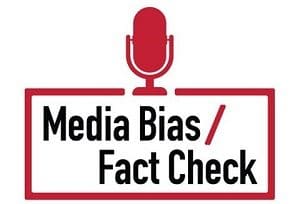RIGHT-CENTER BIAS
These media sources are slightly to moderately conservative in bias. They often publish factual information that utilizes loaded words (wording that attempts to influence an audience by using appeal to emotion or stereotypes) to favor conservative causes. These sources are generally trustworthy for information, but may require further investigation. See all Right-Center sources.
- Overall, we rate NHK (Nippon Hoso Kyokai) Right-Center biased based on story selection that favors Japanese nationalism. We also rate them High for factual reporting due to a clean fact check record.
Detailed Report
Bias Rating: RIGHT-CENTER
Factual Reporting: HIGH
Country: Japan
MBFC’s Country Freedom Rating: MOSTLY FREE
Media Type: TV Station
Traffic/Popularity: High Traffic
MBFC Credibility Rating: HIGH CREDIBILITY
History
Launched in 1926, by the merger of three radio stations, Nippon Hoso Kyokai (NHK), or Japan Broadcasting Corporation is Japan’s public broadcaster.
After World War II, in 1950 NHK was re-established as a public broadcaster and started TV broadcasting. NHK is headquartered in Tokyo. NHK broadcasts two terrestrial TV channels consisting of General and Educational TV, four satellite TV channels, and three radio channels.
NHK provides news, sports, documentaries, and a wide variety of other programs, they also have an early warning system for earthquakes and tsunamis. NHK provides overseas services known as NHK WORLD-JAPAN and offers news and information in English, Japanese, and other languages. Currently, MAEDA Terunobu is the President of the executive board.
Funded by / Ownership
Nippon Hoso Kyokai (NHK) is a public corporation and primarily funded by TV receiving fees (monthly licensing fees), which is the main source of income for NHK. However, NHK overseas is funded by the government. NHK’s Management consists of 12 governors who are approved by both houses of the Diet and are appointed by the Prime Minister. The board of governors approves or dismisses the president, CEO, and the auditors. Further, the NHK board of governors is appointed by the Prime Minister and its budget approved by the Diet (the national legislature of Japan).
Analysis / Bias
Read our profiles on Japan’s media and government
In review, on July 7, 2009, The Japan Times reported that in 2001, NHK censored part of a documentary on wartime history due to direct pressure from conservative Liberal Democratic Party lawmakers, stating that one of those lawmakers was current Prime Minister Shinzo Abe, who put pressure on NHK to alter the content. Another incident occurred in 2005 which involves embezzlement scandals that resulted in the resignation of NHK president Katsuji Ebisawa and two other NHK execs.
In general, NHK publishes articles with neutral wording such as “Kurokawa Former Attorney General’s disposition Explanation given at the Diet”. They also publish reports with minimally loaded language such as this “Waning Middle-Class Identification and Changing Japanese Attitudes towards Society”. Although this story mentions surveys, they do not provide a link to view them.
Editorially, NHK does not produce op-eds, however, political reporting is mostly neutral such as this “Repayment of 100,000 yen” Announcement of additional measures to request the national government Corona. When covering USA political news they report somewhat negatively on President Donald Trump such as this: President Trump gets angry with criticism for two days in a row. On the other hand, NHK has been criticized for favoring the Abe government. For example, PM Abe appointed President Momii Katsuto who stated: “on territorial issues like the disputes over the Senkakus and Takeshima, for example, I think it’s only natural that we clearly espouse the Japanese position.” In general, they report news factually and although the bias is difficult to detect, NHK avoids controversy and promotes Japanese nationalism through story selection.
Failed Fact Checks
- None in the Last 5 years
Overall, we rate NHK (Nippon Hoso Kyokai) Right-Center biased based on story selection that favors Japanese nationalism. We also rate them High for factual reporting due to a clean fact check record. (M. Huitsing 5/27/2020) Updated (02/21/2024)
Source: https://www.nhk.or.jp/
Last Updated on February 21, 2024 by Media Bias Fact Check
Do you appreciate our work? Please consider one of the following ways to sustain us.
or
Left vs. Right Bias: How we rate the bias of media sources


